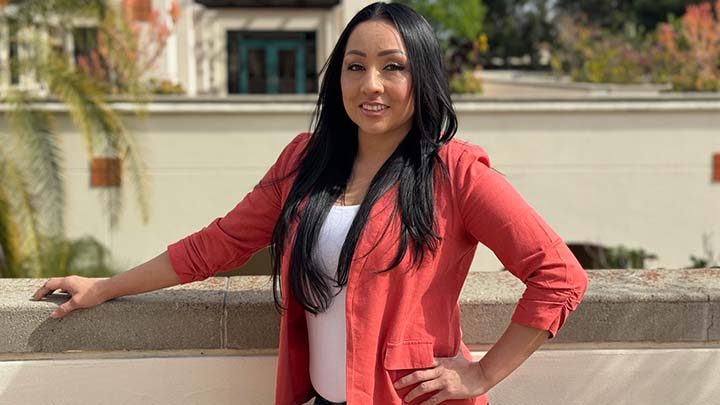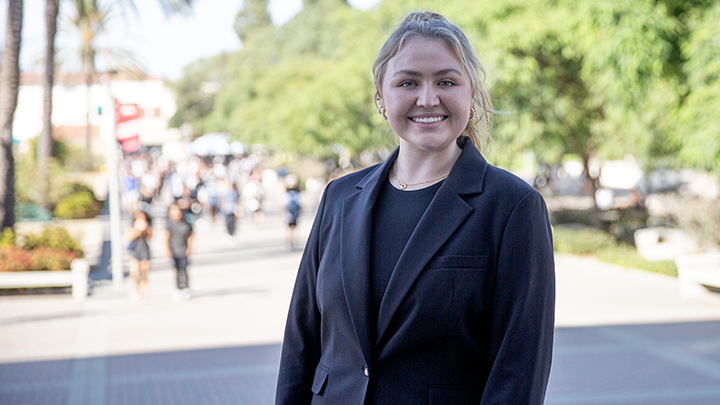Busy breaking the cycle
Earning a master's degree in rehabilitation counseling, Silvia Castillo used education as a fulcrum to turn her life around.

Silvia Castillo says she loves to stay busy.
She’s finishing up her master’s degree in rehabilitation counseling at San Diego State University with a 3.9 grade-point average, two years after earning her bachelor’s degree in social work from the university. She will earn her master’s degree and walk the stage at Commencement this May.
She manages a pair of restaurants and a third job at University of California San Diego, all while raising a 15-year-old son as a single mother.
“I have to stay busy,” Castillo said. “Keeping busy keeps me from going back.”
For Castillo, “back” would be a return to the correctional system and drug addiction, both of which she struggled to escape for more than half of her life.
Since her final release from state prison in 2017, Castillo has used education as a fulcrum to turn her life around. She credits her “hustle,” support network and folks at SDSU’s Project Rebound for helping her climb back from the darkness of her earlier life.
Project Rebound — part of the Center for Restorative Justice in the Division of Student Affairs and Campus Diversity — works with formerly incarcerated students on admission to SDSU and provides student support services once they are enrolled.
“It’s bittersweet to be moving on to the next chapter of my life, and I am grateful for everyone who played a part in helping me get to this point,” Castillo said. “I worked so damn hard to get here, I am going to enjoy it.”
Throughout her early life in Escondido, her family lived in motels and crashed at friends’ homes, she said.
“I didn’t have a bed after age 3,” she recalled.
Castillo remembers attending school “on and off” until sixth grade and dropped out after that. It was around that time she got her first taste of the correctional system, when she was arrested for burglary at 11. At 15, Castillo bounced from group homes to foster care.
“I grew up in the system and I didn’t realize that I was laying a foundation for when I got to be an adult,” Castillo said. “I was living in the walls, both figuratively and literally, and to this day I’m still affected by it.”
Castillo said she did 13 different stints in juvenile hall, jail and state prison from age 11 to age 35, all for burglary or other property crimes. In 2009, she was sentenced to eight years and eight months in state prison for burglary.
The judge at her sentencing called Castillo a “career criminal” and told her if she reoffended, she would likely spend the rest of her life in prison.
“She said I would probably die in prison,” Castillo said. “Something happened this time. I was inside and was looking at the walls and was chanting, ‘I just need one more chance, give me one more chance.’”
Castillo decided at that moment to turn her life around. While serving her time in the Central California Women’s Facility in Chowchilla, she learned to lead a disciplined life, running for miles each day, rain or shine, and held down a job during her time there.
For the final time, she was released in 2017. Castillo immersed herself in her transitional program and enrolled at San Diego City College for the fall semester.
She graduated with her associate’s degree in Social Work and certification in Alcohol and Other Drug Studies in 2019. After being encouraged by then-Project Rebound staff members Francesca Aguirre and Laura Murray, enrolled into SDSU in the fall.
“I had always known about SDSU growing up in San Diego but I never thought it was a place for me,” she said. “I just thought it was for kids who were coming from better home lives and could afford it, and I knew it was very competitive, but my friends encouraged me to come.
“So I applied and I got in, and it was the best decision I could have made,” Castillo said.
She graduated with honors with a bachelor’s degree in social work in 2022, and immediately began graduate school in fall 2022.
Project Rebound officials said Castillo’s success at SDSU is yet another example of the program creating leaders within the community.
“Project Rebound not only aims to help formerly incarcerated students get to and through their college programs, but more so the program is a leadership development incubator to help build the capacity of Project Rebound members to succeed as leaders on their academic journeys, in their professional fields and within their communities,” said David Durand, a manager with Project Rebound. “As Rebounders climb the social ladder, they strengthen pathways for future generations of students, humanize people with lived experience in all spaces and change the cycle of struggle that has plagued many families and communities for generations.
“Silvia is a prime example of this, where Project Rebound helped her unleash her true potential to forge a path in life she deserves for herself and her community,” Durand said.
Since she started at SDSU, Castillo has maintained a near perfect grade-point average, all while working, as she said, “from morning to night.”
For Castillo, her days are a grind filled with classwork. She studies 5-6 hours per day between shuttling to her jobs as a manager of the Havana Grill restaurants in Clairemont and Mission Valley.
She is also a service navigator at UC San Diego’s RELINK, a program that connects justice system-involved adults with health resources and other supportive services. In her position, Castillo, whose master’s degree will have a concentration in clinical rehabilitation counseling, conducts client intake assessments and helps connect them to health and social services and resources.
Victoria Ojeda, a professor at the Herbert Wertheim School of Public Health and Human Longevity Science, is the director of the RELINK project. She said Castillo has been a “perfect fit” in the program, and she expects great things from her in her future endeavors.
“Silvia will continue to excel in her profession because she is a hard-working professional who draws on her experiences, builds relationships with community resources — and she brings compassion, empathy, professionalism and humor to her services,” Ojeda said. “I am inspired by Silvia, because she is undaunted and does everything she can do to meet clients where they are in their personal journey as they work toward their goals.”
What keeps Castillo busy, she said, is leaving an example for her son of breaking her family’s cycle of addiction and recidivism.
“I want him to see that I’ve broken the cycle, walking through my own adversity and doing it for the both of us,” Castillo said, pointing to her heart. “I always tell him, whatever I’m building, I want to get rich here, I don’t want to get rich financially. I just want to be happy. But I know because of my hustle I know what’s going to come. I can’t see it, but I know it will happen.
“But that legacy (I leave) is that hard work pays off, that is how we become happy.”



